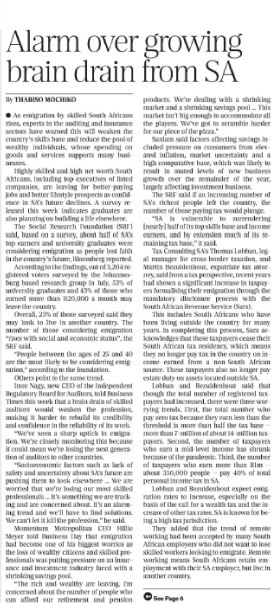
ALARM OVER GROWING BRAIN DRAIN FROM SA
As emigration by skilled South Africans rises, experts in the auditing and insurance sectors have warned this will weaken the country’s skills base and reduce the pool of wealthy individuals, whose spending on goods and services support many businesses.

Legal Manager:
Cross-Border Taxation
Martin Bezuidenhout
Expatriate Tax Attorney
SOURCED FROM

As emigration by skilled South Africans rises, experts in the auditing and insurance sectors have warned this will weaken the country’s skills base and reduce the pool of wealthy individuals, whose spending on goods and services support many businesses.
Highly skilled and high net worth South Africans, including top executives of listed companies, are leaving for better paying jobs and better lifestyle prospects as confidence in SA’s future declines. A survey released this week indicates graduates are also planning on building a life elsewhere.
The Social Research Foundation (SRF) said, based on a survey, about half of SA’s top earners and university graduates were considering emigration as people lost faith in the country’s future, Bloomberg reported.
According to the findings, out of 3,204 registered voters surveyed by the Johannesburg-based research group in July, 53% of university graduates and 43% of those who earned more than R20,000 a month may leave the country.
Overall, 23% of those surveyed said they may look to live in another country. The number of those considering emigration rises with social and economic status”, the SRF said. “People between the ages of 25 and 40 are the most likely to be considering emigration,” according to the foundation. Others point to the same trend. Imre Nagy, New CEO of the Independent Regulatory Board for Auditors, told Business
Times this week that a brain drain of skilled auditors would weaken the profession, making it harder to rebuild its credibility and confidence in the reliability of its work. “We’ve seen a sharp uptick in emigration. We’re closely monitoring this because it could mean we’re losing the next generation of auditors to other countries.
“Socioeconomic factors such as lack of safety and uncertainty about SA’s future are pushing them to look elsewhere… We are worried that we’re losing our most skilled professionals… It’s something we are tracking and are concerned about. It’s an alarming trend and we’ll have to find solutions.
We can’t let it kill the profession,” he said. Momentum Metropolitan CEO Hillie Meyer told Business Day that emigration had become one of his biggest worries as the loss of wealthy citizens and skilled professionals was putting pressure on an insurance and investment industry faced with a shrinking savings pool.
“The rich and wealthy are leaving. I’m concerned about the number of people who can afford our retirement and pension products. We’re dealing with a shrinking market and a shrinking savings pool…
This market isn’t big enough to accommodate all the players. We’ve got to scramble harder for our piece of the pizza.” Salam said factors affecting savings included pressure on consumers from elevated inflation, market uncertainty and a high comparative base, which was likely to result in muted levels of new business growth over the remainder of the year, largely affecting investment business.
The SRF said if an increasing number of SA’s richest people left the country, the number of those paying tax would plunge. “SA is vulnerable to surrendering [nearly] half of its top skills base and income earners, and by extension much of its remaining tax base,” it said.
Tax Consulting SA’s Thomas Lobban, legal manager for cross-border taxation, and Martin Bezuidenhout, expatriate tax attorney, said from a tax perspective, recent years had shown a significant increase in tax pavers formalising their emigration through the mandatory disclosure process with the South African Revenue Service (SARS).
This includes South Africans who have been living outside the country for many years. In completing this process, SARS acknowledges that these taxpayers cease their South African tax residency, which means they no longer pay tax in the country on in- come earned from a non-South African source.
These taxpavers also no longer pay estate duty on assets located outside SA. Lobban and Bezuidenhout said that though the total number of registered taxpayers had increased, there were three worrying trends.
First, the total number who pay zero tax because they earn less than the threshold is more than half the tax base more than 7 million of about 14-million taxpayers. Second, the number of taxpayers who earn a mid-level income has shrunk because of the pandemic. Third, the number of taxpayers who earn more than Rim about 350,000 people – pay 40% of total personal income tax in SA.
Lobban and Bezuidenhout expect emigration rates to increase, especially on the basis of the call for a wealth tax and the increase of other tax rates. SA is known for being a high tax jurisdiction.
Thev added that the trend of remote working had been accepted by many South African emplovers who did not want to lose skilled workers looking to emigrate. Remote working means South Africans retain employment with their SA employer but live in another countrv.
Contact US

Zero Hour
EXPAT TAX RETURNS DUE THIS FILING SEASON
The past two years have been a journey into unchartered waters for all, and a particularly tense time as far as South African expatriates are concerned. For many expats, more and more questions have been left unanswered as this filing season, and the tax filing period draws to a close on 23 November.
One thing, however, is evident – SARS will specifically be looking at expatriate tax compliance as a key aspect of compliance enforcement this year. This has led to much consternation for taxpayers, with many considering whether they have been compliant and if the tax position they are taking is correct.
This is an especially relevant concern for expatriates abroad who
- intend on permanently returning to South Africa at some point within the foreseeable future;
- who are completely uncertain as to whether they will return; and
- do not intend to return to South Africa.
Some of these expatriates may have already been –
- incorrectly relying on the application of a DTA;
- incorrectly relying on the foreign employment income exemption provided for in the South African Income Tax Act (now limited to R1,25 million); or
- simply not disclosing their foreign income in their returns to SARS.
Easy Answers, with a Pinch of Salt
With much uncertainty abound, many taxpayers have been heading to SARS for clarity on where they stand. For example, a common question asked is whether a taxpayer would be considered a resident or non-resident for tax purposes, and how this will affect their filing position.
Something that has become abundantly clear in recent days, however, is that this is generally best avoided. This is also a legitimate cause for concern, given that the answers provided to these taxpayers has ranged from the absurd to downright reckless.
In 2018, the Constitutional Court in Marshall NO v Commissioner for SARS stated, with reference to a taxpayer’s reliance on SARS’ unilateral interpretation of South Africa’s tax laws, that doing so “is best avoided”. This is the case for many reasons, not the least of which being that the role of SARS is to collect tax revenue, not to help taxpayers avoid tax liability.
Beware of Half-Baked Advice
Aside from SARS, another avenue available to taxpayers is to seek advice from a tax practitioner. This is without a doubt, the most appropriate route to follow to get the answers you seek, regarding remaining (or becoming) compliant with your tax affairs.
However, one should be weary of one-size-fits all approaches or off-the-cuff advice that seems too good to be true. The simple fact of the matter is that not every player on the field will have their eye on the ball or their clients’ best interests at heart regarding tax compliance or accepted SARS practices.
The truth of the matter is that the determination of one’s tax residency is an exhaustive, fact-driven process which involves the consideration of various factors in relation to the taxpayer concerned, including whether this should be determined solely with reference to South Africa’s domestic tax laws or by correctly applying the provisions of a DTA. In most cases, this is simply not correctly done – for example, you cannot rely on a DTA for non-residency without a tax residency certificate.
This means that, ideally, one should look to a consulting firm that has an in-house legal component, in order to ensure that the advice provided is in view of a proper interpretation of the laws concerned. An incorrect interpretation of the law can lead to very damaging consequences for a taxpayer, especially where this concerns their tax residency, or the application of a DTA in claiming tax relief. This damage can even be felt by a taxpayer years after the fact – there is no limit to how far back SARS can go when conducting an audit.
Distilling Your Tax Position
Filing season for the year of assessment ending February 2020 runs from 01 July – 23 November 2020 for most taxpayers. This includes South African expatriates who, whether they know it yet or not, will be required to submit an income tax return with SARS.
Details such as whether one is an employee or an independent contractor, for example, may completely erode one’s eligibility for the foreign employment income exemption and in which case a DTA or formalisation of the termination of their tax residency in South Africa may be their saving grace. The alternative to this is a potential shock for the taxpayer when SARS comes knocking.
It needs to be known that foreign income earned by a South African resident expatriate is indeed taxable in South Africa, and leaving these amounts off one’s return is incorrect – in fact, this is a prime example of non-compliance that (when found by SARS) may very well open a proverbial Pandora’s box for the taxpayer concerned.
Out of the Frying Pan…
For taxpayer’s that are at risk of incurring tax liability in South Africa, in respect of their foreign income, now is the time to have those difficult discussions needed to ensure that they remain tax compliant. If you have tax questions needing answers, it is important to grill someone sooner rather than later.
Further, for taxpayers who foresee that they will incur tax liability in South Africa for this current year of assessment, taking action now, ahead of next year’s return, is not just highly recommended but sometimes absolutely necessary where action is needed to mitigate their South African tax liability.
Expatriate tax has been one of the most contentious tax issues in recent memory and will become ever-more so in the days to come. What this boils down to is that South Africans abroad need to make sure that they have the correct advisor to assist them in their circumstances, and take the correct tax position based on a proper interpretation of the law.


